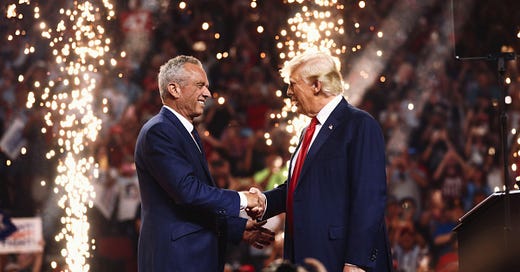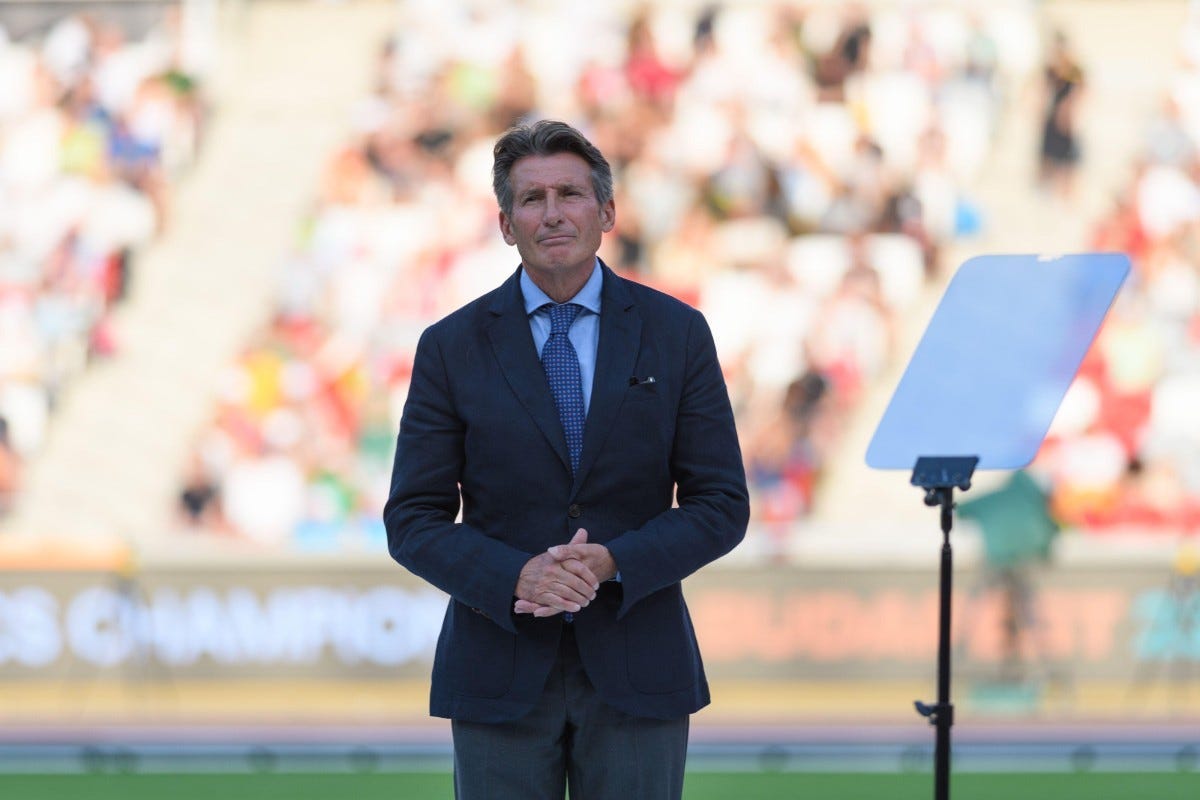Why RFK Jr is Trump's most divisive cabinet pick yet - amid stiff competition
Selecting Robert F. Kennedy Jr to be the nation’s health secretary could have big implications for America's future vaccination rates.
Donald Trump has made good on his word – and is stirring considerable controversy in doing so – after picking Robert F. Kennedy Jr to be the nation’s health secretary.
Kennedy is slated to direct the health and human services department's 80,000 employees, with big implications for the future of America’s food, pharmaceuticals, medical research and vaccination efforts.
The selection, while provocative, is not entirely surprising given Trump’s vow to promote his former opponent to a role where he could “go wild on health”.
After Kennedy ended his own bid for the US Presidency and swiftly endorsed Trump back in August, Trump later brought him on stage at a campaign rally, declaring Kennedy was going to help him "make America healthy again".
Yet the alliance is not an entirely natural once as Kennedy, an environmental lawyer and former longtime Democrat, has clashed with Trump on numerous occasions on climate change, oil, and Covid-19 lockdowns. Trump, however, dismissed their political differences in his victory speech, saying the two will have a “good time” cooperating on health matters as long as “Bobby leaves the oil to me”.
Kennedy’s endorsement of Trump in August was among the most consequential in the election cycle, as RFK - who was running as an independent - was polling steadily around 4-8 per cent prior to his capitulation. Many, not all, of his supporters followed his lead in voting for Trump, especially those fixated on niche matters such as vaccines, water fluoridation, and agro-chemical issues.
Public health experts have consistently denounced RFK Jr’s stances on these matters over the years and Kennedy has been censored off numerous platforms, allegedly at Biden’s request, for his “dangerous opinions”. RFK Jr has consistently correlated mainstream vaccines such as the measles, mumps and rubella jab to the rise in autism in America and has declared that “there is no vaccine that is safe and effective”. Despite his multi-decade crusade against vaccines, he has affirmed that he is not “anti-vax” and simply wants to “restore transparency” around the approval process.
While a ban on common vaccines is very unlikely, perhaps impossible, jab scepticism radiating from the top health position is poised to affect guidelines, rhetoric, and ultimately individual decisions across America. Polling indicates that vaccine scepticism is already growing among Americans and that childhood vaccination rates are dropping. While RFK Jr has had some influence, the shift has been largely attributed to frustration over the Covid-19 immunisation effort which put tens of thousands of non-compliers out of work and banned many from participating in public life.
Kennedy’s appointment is stoking fears that Samoa-style measles outbreaks could make their way to communities across the US. In the case of Samoa in 2019, a devastating wave of measles killed dozens of children in a remote community with low vaccination rates. Many have laid blame for the tragedy at the feet of RFK Jr himself, who travelled to the affected community to promote an anti-vax message just prior to the outbreak.
Kennedy has yet to make vaccines a major focus of his MAHA agenda yet, opting instead to confront the obesity and chronic illness crises. In recent weeks, he has railed against “big food” and has pledged to remove pesticides, pollutants, and toxins from US agriculture. Commonly-used chemicals such as potassium bromate and paraquat could now be subject to restriction as Kennedy aims to align US standards with those of the UK and Europe, where those substances and many others are restricted for their potentially carcinogenic effects.
Kennedy believes crackdowns on such chemicals could make a dent in the chronic disease epidemic in which over half the US population are affected by at least one serious condition. The US Department of Defense has estimated 77 per cent of young adults are unfit for military service due to medical disqualification - a national security crisis in its own right.
RFK thus divides opinion in the US. A large chunk of the public view him as a common-sense health aficionado who can save America from its obese, cancerous spiral. Others – including many medical professionals – view his vaccine scepticism as dangerous and his anti-fluoride and anti-wifi beliefs as downright bizarre.
While Trump has opted for some “normal” traditional Republican figures such as Marco Rubio, RFK Jr is certainly not the only atypical and contentious cabinet selection. Other eyebrow raisers from the week include Matt Gaetz for attorney general, a congressman who famously torpedoed his own party’s speaker and has been investigated for statutory rape, and Tulsi Gabbard for director of national intelligence, an austere anti-interventionist whose affinity for Vladimir Putin and Bashar Al-Assad allegedly landed her on the Biden administration’s travel watchlist.
Trump’s cabinet is shaping up to be an odd one - where radical outsiders such as RFK Jr dictate the future of the nation’s health and where Putin-sympathetic voices such as Gabbard work across from hawkish neoconservatives such as Rubio.
Josh Schlicht
Reaction Reporter
ON REACTION TODAY
Jenny Hjul
Sebastian Coe is a sporting legend in a league of his own
Tim Marshall
Why the Battle of Kursk is so consequential
Gerald Warner
Labour’s war on farmers threatens Britain’s food security
ALSO ON REACTION
Stop and Look: Mother with Dead Child by Kollwitz Andrew Wilton
Lucidity is a frank exploration of the power of music on memory Gerald Malone
The best investments of the last quarter century Neil Collins
ALSO KNOW
Growth slows in Britain - The UK economy grew by just 0.1% between July and September, according to new stats out today, marking a disappointing start for Chancellor Rachel Reeves who said she was “not satisfied” by this figure. This growth rate was lower than expected and marked a significant slowdown from the 0.5% growth experienced during the second quarter. Shadow Chancellor Mel Stride hit out at the government, declaring: "we left the fastest growth in G7. Labour talked down the economy. Now we see the results.”
Scholz and Putin speak - German Chancellor Olaf Scholz and Russian President Vladimir Putin have spoken directly for the first time since December 2022. Whilst the exact details of their conversation are not yet known, Scholz tweeted that he encouraged his Russian counterpart to “withdraw his troops” and “negotiate” with Ukraine to achieve a “just and lasting peace”. The Kremlin stated that it “remains open to resuming negotiations that were interrupted by the Kyiv regime.”
Hamas “ready” for ceasefire - Hamas political bureau member, Bassem Naim, told Agence France-Presse (AFP) that the group was “ready” for a ceasefire, before adding that it had not received any “serious proposals” from Israel in months. This comes amid a new statement from the UN today that aid deliveries to parts of the besieged north of the enclave are all but impossible. Meanwhile, Ali Larijani, an advisor to Iran's supreme leader, has claimed that Iran is not looking to “sabotage” any ceasefire proposals between Lebanon and Israel, and will back any decision taken by Beirut on the matter.
Israel hit Iranian nuclear weapons research lab: According to a report by Axios, Israel’s strike on Iran on 25 October “destroyed an active top secret nuclear weapons research facility in Parchin”, a military base located approximately 30 kilometres southeast of Tehran. The strike significantly damaged Iran's effort over the past year to resume nuclear weapons research, according to both Israeli and American officials.
FIVE THINGS
Curated by the Reaction Team - Dorian Bovay
The sun begins to set on Olaf Scholz’s chancellorship, writes The Economist.
Sohrab Ahmari in Compact Magazine on how Trump won the War over "normal".
The Budget could drive 70 per cent of universities into the red, writes Nicola Woolcock in The Times
Russia’s war economy is hitting its limits, writes Marc R. DeVore in Foreign Policy
A bullet train for power: China's ultra-high-voltage electricity grid, explored by Xiaoying You in BBC Future









Not impressed with this take at all.
As I think RFK quipped himself: "I've campaigned for 30 years to get mercury out fish, does that make me anti-fish?".
Part of the problem with all the terrible decisions made during 2020-2022 was media outfits just reading out big pharma PR as "news".
Weaponising the tragic Samoan story is particularly egregious, as Samoa and neighbouring islands did actually have quite high vaccination rates for measles prior to the outbreak you refer to. So why did an outbreak happen in the first place (the jabs are supposed to stop outbreaks, after all), and why were they short of the main treatment, Vitamin A? And we've now acknowledged the 2020 lockdowns in the West were very damaging, are we to assume that the Samoan lockdowns in 2019 (yes, look them up) were harmless and had no collateral damage?
Consider cui bono?
All cows are animals, that does not make all animals cows.
Some vaccines may be safe and effective, that does not make all injections safe and effective.
I'm surprised that Reaction should be afraid of a little transparency and cleansing sunlight on what has been a somewhat murky and opaque industry.